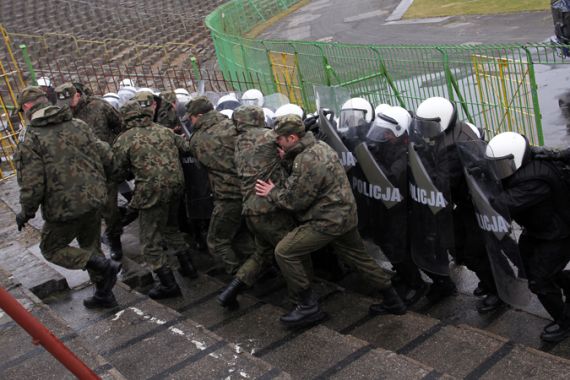Poland’s biggest Euro challenge
From the threat of terrorism to hooliganism, Euro 2012 host Poland is facing its biggest security challenge in decades.

As its team prepares to take to the pitch at Euro 2012, tournament host Poland is bracing for its biggest security challenge in decades.
With hundreds of thousands of fans from across Europe set to flood in, Poland is sanguine about heading off risks ranging from hooligan brawls to terrorism.
Keep reading
list of 4 itemsHolders Man City go out of Champions League on penalties to Real Madrid
Barca crash out as Mbappe brace leads PSG to Champions League last four
Saudi reviews football fan rules after whip attack
As the first edition of the 16-nation tournament behind the former Iron Curtain, Euro 2012 is a crucial showcase. Terrorism fears swirling around major events such the quadrennial European championship have led host nations to boost security over the years. That’s not to say that the Poles see a major risk.
“There is no sign of the existence of any real external threat concerning the security of our country during Euro 2012,” President Bronislaw Komorowski said after a recent meeting of his National Security Council.
Influx
Euro 2012 kicks off in Warsaw on June 8 and ends on July 1 in Kiev, capital of fellow host Ukraine.
Safety in the skies is a major plank. A total of 2,300 charters and 13,800 scheduled aircraft are due to land in Warsaw alone.
“We’re expecting to break all records for volume of traffic in June,” said Andrzej Ilkow, head of flight security at Warsaw’s Chopin Airport.
“We’re ready to handle up to 60,000 people a day, arrivals and departures combined.”
Ex-communist Poland joined NATO in 1999, and has held Euro 2012-related air exercises with its US allies.
From June 7 to July 2, the Polish military will mount a round the clock operation, with no-fly zones in force over the teams’ hotels and training grounds, as well as the stadiums on match days.
“If necessary, military aircraft will intercept, identify, guide or force planes to land, fire warning shots and, as a last resort, destroy them,” the air force’s General Lech Majewski told Polish news agency PAP.
A thousand troops will be tasked with air defence during the tournament, out of 3,300 involved in Euro 2012 security. A further 9,000 will be in reserve. The military’s crisis-unit chief Colonel Miroslaw Banasik declined to disclose the risks in the crystal ball.
“The range of scenarios is very broad,” he said.
But he pointed to the July 2011 massacre of 77 people in Norway by right-wing extremist Anders Behring Breivik, and a stampede at the 2010 Love Parade in Germany that claimed 21 lives.
Hooliganism
A more typical threat is hooliganism.
While the spectre of violent Poland fans was raised at the 2006 World Cup in Germany and Euro 2008 in Austria, there was little trouble.
But concerns are different on home turf. Poland is home to what the police estimate is a club hooligan hardcore of 5,000, in a nation of 38.2 million. Since the fall of communism two decades ago, Eastern Europe has seen a rise in hooligan gangs modelled on the English “firms” of the past or Italy’s – fertile territory for the far right and criminal networks.
Long accused of being too lax, Poland swung into action after violence marred last year’s cup final. The law now allows fast-track handling of cases in stadiums, as well as increased electronic tagging to ensure individuals hit with match bans are kept out.
“What concerns us most is the behaviour of supporters in public areas, notably fanzones,” said Jacek Zalewski of the interior ministry.
Over recent weeks, dozens have been arrested in probes of “ustawki” – pre-arranged brawls between rival Polish clubs’ fans that have claimed lives over recent years. Though the authorities underline that the vast majority of fans from Poland and beyond are peaceful, policing is being beefed up.
“Over 10,000 officers will be ready to guarantee the tournament’s security,” said national police chief Marek Dzialoszynski.
Huge operation
Poland has tapped foreign forces for “spotters” who know their own fans inside out.
“It’s the biggest ever operation conducted by the Polish police, of an international scale because we’re working with forces from 21 other countries,” said Dzialoszynski.
Poland’s June 12 group match against its former master Russia is seen as the most politically-charged game, though Polish authorities have played down concerns about violence.
During the championship, Poland will resume border controls with European Union neighbours Germany, the Czech Republic, Slovakia and Lithuania, dropped in 2007.
Non-EU fans such as Russians in any case need visas, making it easier to halt those with a hooligan record.